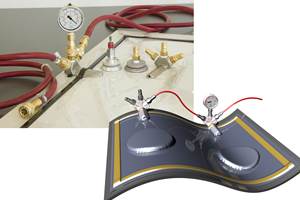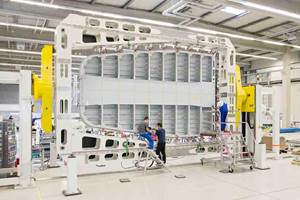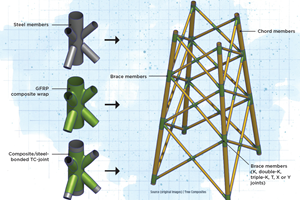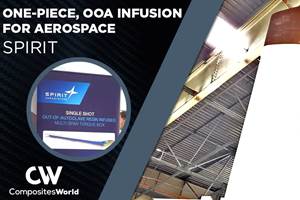Engel: Full speed ahead on composites R&D
CW attended the Engel Symposium 2015 and visited its Technology Center for Lightweight Composites in St. Valentin, Austria.
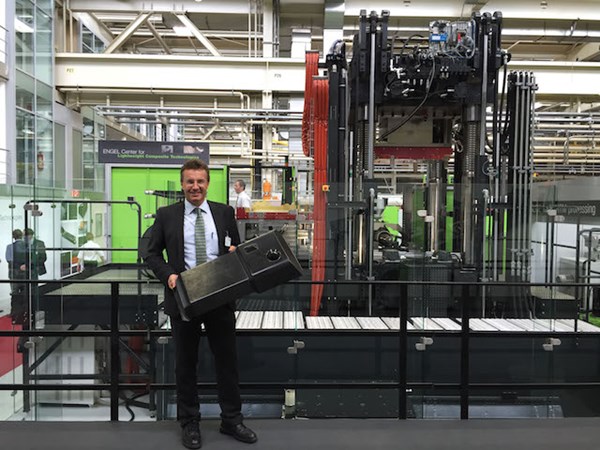
Peter Egger, director of the Engel Center for Lightweight Composites.
Injection molding manufacturer Engel recently hosted more than 3,000 customers and partners at its facilities in St. Valentin and Linz, Austria. I attended the symposium that took place in picturesque Austria and spent some time at Engel’s Technology Center for Lightweight Composites, which was established in 2012 at St. Valentin. Engel showcased the work being done at the technology center, while at the same time, calling attention to the importance of collaborative research in composites R&D.
Together with its partners Fill (Gurten, Austria) and Hennecke (St. Augustin, Germany), Engel demonstrated the HP-RTM process with a generic test component on an Engel v-duo 3550/1100 machine during the symposium. Hennecke is its partner for polyurethane processing; Fill specializes in the production and processing of fiber-reinforced composite preform elements. Thanks to the close cooperation with its partners, Engel can also provide highly integrated system solutions—including the production of preforms—for the production of FRP components from a single source.
Peter Egger, director of the Engel Center for Lightweight Composites, told me that the center allows the company to work on the intensive interdisciplinary development of fiber composite technology together with partner companies and universities.
Engel recently annouced that it is currently building a v-duo 3600 machine for the Open Hybrid Lab Factory in Wolfsburg, Germany. Engel is a founder member and sponsor of the research center initiated by Volkswagen in 2012 and supported by Germany’s Federal Ministry of Education and Research. With clamping force of 36,000 kN, the Engel v-duo 3600 is the largest machine in its series. One machine in the same clamping force class is installed at BMW’s Landshut factory, where large structural components of fiber-reinforced plastic composites are manufactured using the HP-RTM process.
Engel developed its v-duo series specifically for fiber-reinforced processing. In contrast to the presses conventionally used in such applications, Engel vertical machines have a relatively small footprint, the company says. The height and weight of the machines are much lower, which reduces the foundation building overhead. The clamping unit can be accessed from all four sides instead of just two due to a very high rigidity as well as the parallelism of the mold mounting platens.
Currently, the company is focused on solutions for the automotive market. (Egger did say they are also interested in both aerospace and electronics). With regards to lightweight design in the automotive market, new processes as well as new materials must be developed for automotive manufacturing.
“One of the biggest challenges is design—there are a lot of nice products, new materials and very good processes, but still a very big gap on how to design the parts for composites,” he said.
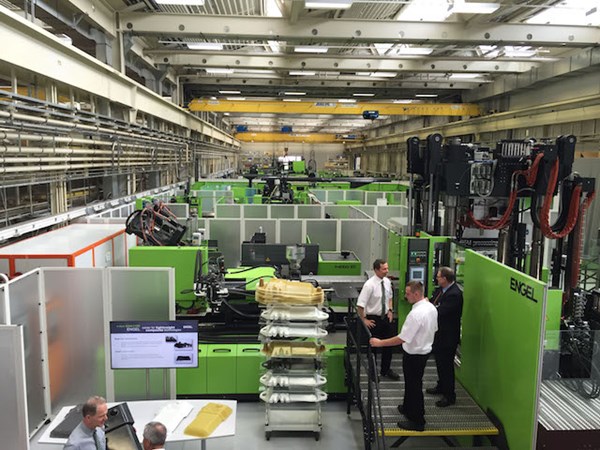
Each day, Engel stays focused on driving the industrialization of the composites process forward.
“The speed of development and the speed of getting composites in the marketplace is still quite low if you look at how long people are working with it,” Egger said. “The goal is go from handwork to serial production. The advantage of Engel is that we are more used to serial work and the quality control implementation that is part of the injection molding machine process.”
Related Content
SmartValves offer improvements over traditional vacuum bag ports
Developed to resolve tilting and close-off issues, SmartValves eliminate cutting through vacuum bags while offering reduced process time and maintenance.
Read MoreFrom the CW Archives: Airbus A400M cargo door
The inaugural CW From the Archives revisits Sara Black’s 2007 story on out-of-autoclave infusion used to fabricate the massive composite upper cargo door for the Airbus A400M military airlifter.
Read MoreNovel composite technology replaces welded joints in tubular structures
The Tree Composites TC-joint replaces traditional welding in jacket foundations for offshore wind turbine generator applications, advancing the world’s quest for fast, sustainable energy deployment.
Read MoreVIDEO: One-Piece, OOA Infusion for Aerospace Composites
Tier-1 aerostructures manufacturer Spirit AeroSystems developed an out-of-autoclave (OOA), one-shot resin infusion process to reduce weight, labor and fasteners for a multi-spar aircraft torque box.
Read MoreRead Next
All-recycled, needle-punched nonwoven CFRP slashes carbon footprint of Formula 2 seat
Dallara and Tenowo collaborate to produce a race-ready Formula 2 seat using recycled carbon fiber, reducing CO2 emissions by 97.5% compared to virgin materials.
Read More“Structured air” TPS safeguards composite structures
Powered by an 85% air/15% pure polyimide aerogel, Blueshift’s novel material system protects structures during transient thermal events from -200°C to beyond 2400°C for rockets, battery boxes and more.
Read MoreVIDEO: High-volume processing for fiberglass components
Cannon Ergos, a company specializing in high-ton presses and equipment for composites fabrication and plastics processing, displayed automotive and industrial components at CAMX 2024.
Read More













.jpg;maxWidth=300;quality=90)

